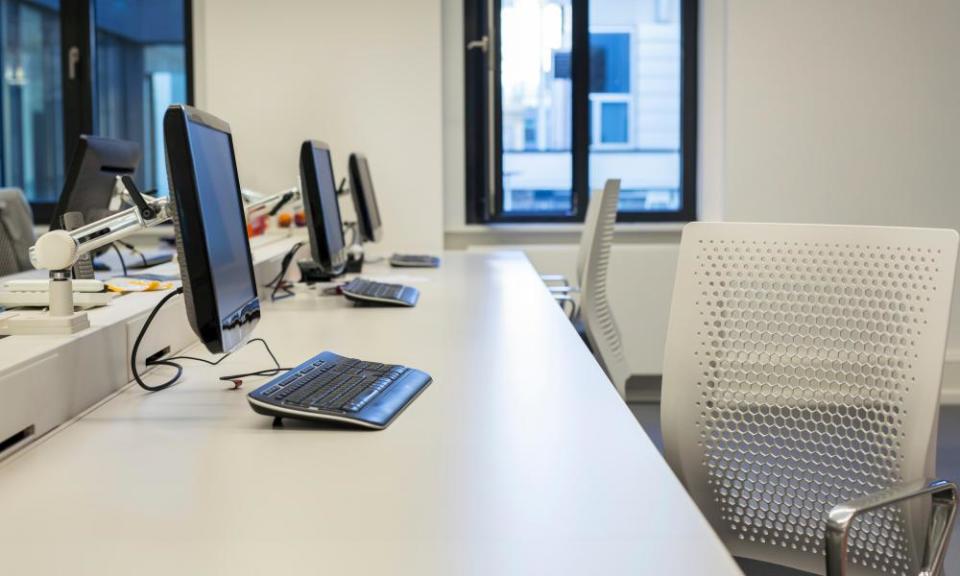The future of workplaces: how Covid-19 will transform office life

As the coronavirus pandemic continues to surge in parts of the US, some companies have moved forward with plans to let their employees re-enter the office after months of working from home.
In the absence of federal guidelines around best practices, office managers will likely need to rely on an abundance of caution. This may turn offices into ghost towns of their former selves, with gatherings by the water cooler, big meetings, and buzzing shared spaces disappearing for the foreseeable future.
‘De-densifying’ is the new ‘social distancing’
If your office decides to move forward with reopening, you may start to hear the phrase “de-densifying” in conversations about how to do so safely. The term, which many schools have used when laying out plans for reopening in the fall, refers to restricting the number of people who have access to a given space at any one time, in order to ensure social distancing.
For offices, that could mean phased re-openings. “It is important to note that not all employees will return to a location at the same time,” said JPMorgan Chase in a May memo to employees, obtained by the Guardian. “It will happen in waves over a period of time, with business leaders prioritizing who returns when.”
It could also mean major changes to the physical layout of your office. The 100-person tech firm Submittable reports experimenting with different seating arrangements to avoid clustered workspaces. It is also planning staggered workdays, with teams rotating between designated days in the office.
With health officials predicting another wave of the virus in the fall, this staggered standard will likely continue over the next six to twelve months.
Say goodbye to big meetings and staff socials for now
While big office meetings may not officially be a thing of the past yet, “they’re most certainly aren’t a thing of the immediate future,” said Asta So, Head of People at Submittable. “We may have smaller groups in large meeting rooms, while everyone’s wearing a face mask.” The virtual meetings and social gatherings that have developed over the last two months will likely remain the norm.
PPE at work will be the new normal
Stations for personal protective equipment, like hand sanitizer, masks and gloves, will be new permanent fixtures in offices, placed at entrances, exits and other strategic locations. Forward-thinking businesses may have stations for you to recycle your masks and gloves as well. Branded, individual back-to-work safety kits will now be as common as zip drives and pens: companies like iPromo, a Chicago-based bulk supplier, have been selling personal kits to offices by the thousands. Some of these include sanitizer, masks, gloves, tissues, soap, a stylus pen for use on high-touch surfaces like printers and elevator buttons, and brass antimicrobial hook-style keys that can open door handles.
Wipe it down
Even though we now believe the virus is not as easily transmitted via contact with contaminated surfaces, workers will likely need to get into the habit of wiping down their desk and other office supplies. Most janitorial services can’t keep up with the now-constant disinfectant requirements of things like elevator buttons and faucet buttons.
“We might add wiping high-touch surfaces to office task lists,” So said. “And we’ll be asking employees to make choices that avoid touching potentially contaminated surfaces, like taking the stairs instead of the elevator.”
Expect your temperature taken regularly
No-touch infrared thermometers have already been spotted in certain businesses, including airports and restaurants. Even though experts have said these tools have limitations for curbing the spread of Covid-19, including reporting false positives and user error, workers can still expect these to make more frequent appearances in the office.
The state of Connecticut, for example, announced in May that it would distribute 50,000 infrared thermometers to small businesses and non-profits. Some businesses may even spring for a body thermal scanner at office entrances, like Amazon has done at its warehouses. “High-tech fever detectors are coming,” said Friedman.
Prepare for your health care plan to change
A recent survey of employers conducted by Willis Towers Watson found that almost half of companies surveyed (47%) are enhancing health care benefits for employees in the face of Covid-19. Forty-five percent of respondents reported expanding wellbeing coverage, and 33% reported planning changes to paid time off policies. While coverage of Covid-19 treatment for employees isn’t federally mandated, new legislation, effective 18 March, required group health plans to cover testing and related services without cost sharing.
At the same time, experts predict that health insurance premiums for employers will rise in 2021 anywhere from 4% to 40%, based on recent filings from health insurance companies with the District of Columbia’s Department of Insurance, Securities and Banking. A report from Covered California predicted employers “no longer being able to offer affordable coverage, or dramatically shifting costs to employees”.

